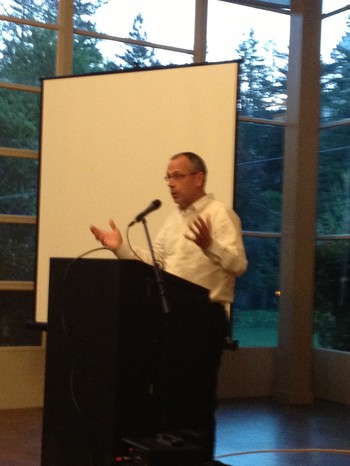Nathan George freely admits that his life “can look like that of a loser, not an obedient servant of God.”
A successful software entrepreneur in his native Britain, George told a crowd of about 100 listeners here April 11 at San Francisco Theological Seminary’s annual Faith & the Common Good lecture that he increasingly “became disturbed by God, dislodged from my life of ambition and consumption and bothered by the excess of my life.”
And so, seven years ago, George and his family moved from the UK to northern California where he founded “Trade as One,” and online fair trade company that seeks to use consumer spending to create jobs for some of the most disadvantaged people in the world.
The Faith & the Common Good Lecture, endowed by retired SFTS Professor John S. Hadsell and his late wife, Virginia, features “a person of faith who exemplifies both excellence and service in their vocation.
Trade as One’s hallmark program is a “subscription” service. Each subscriber receives a quarterly box of 12-15 food items ― at $99 per box ― plus producer interviews, product history, recipes and more. Trade as One contracts with producers to ensure all food items are natural, organic and fair trade.
“I realized by reading the Bible and theology that I was completely missing the good news to the poor of the gospel and that good news has to be tangibly demonstrated. I began to ask what business practices have to do with that.”
George offered his resignation to his UK employer, but the company’s CEO retained him as an employee, helped him move to California and allowed him to work part time so that he could start Trade as One.
“I am learning to trust in a God who loves me and will protect me because He knows the path to true life,” George said.
George’s search led him to hear stories of human trafficking. “It completely blew me away,” he said. “I learned that the absence of good work is itself a theological issue and to see the difference dignified jobs ― as opposed to the demeaning slavery of human trafficking ― can make in a community.”
George got involved in the fair trade movement in the UK, where fair trade is far more prevalent in the U.S. “Because of my business travels in the U.S., I wondered why the same isn’t happening in the States,” he said.
George was told, he said, “Americans are consumers first and Christians second.” This only steeled George’s resolve to advance fair trade in the U.S.
“The first few years were an abject failure,” George conceded. Many times he was just days or weeks from running out of money, but supporters continued to come to his aid. “Church after church slammed its door in my face,” he said. But five years ago “one of the largest megachurches in the country invited me to teach their members what fair trade is all about and things really started happening.”
Trade as One’s financial road is still rocky “but God has been with us through it all and I’ve gotten to know God much more intimately,” George said, conceding that he’d “still like to see more signs of success.”
George said he’s learned three important lessons in his work as CEO of Trade as One:
- There is no contract for success apart from God’s faithfulness.
- The promise is only that we will have God with us ― “not necessarily His gifts, but certainly his presence.”
- The gospel is a call to examine the enormously privileged life we live ― “God’s intent is that no one should live in poverty.”
Once Christians ― and others ― start to make sacrificial action, “consumer culture loses its grip on us for the sake of Jesus’ gospel,” George said. “The myth of scarcity creates fear, but the gospel affirms that there is abundance and myth of scarcity is actually danger to our souls.”
To learn more about Trade as One and its subscription service, visit www.tradeasone.com.

